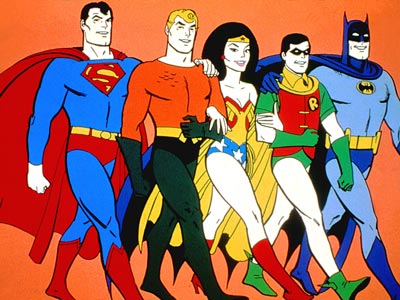
It is difficult to explain the now extinct Saturday morning cartoon experience to anybody under twenty-five, but it shared certain qualities with a Sunday morning religious service, where one dressed in ratty pajamas and multihued Underoos in lieu of serge suit and neck-restricting tie. A soaky bowl of cornflakes replaced the stale sacramental pomp and circumstance of wafers, offering an altogether different eucharist metaphor with slightly more nutritional value. Leaden and predictable hymns, in which one was badgered into belting out a tinny tune identified by number, were uprooted by Hoyt Curtin’s jazzy cues for Hanna-Barbera. And the ethical lessons arising from a pastor’s ponderous sermon found an uncanny surrogate with the didactic messages tacked onto the end of an animated adventure. Both slipped through the mind like a sieve.
But since nostalgia is a dangerous narcotic, the cartoons have retained an entirely irrational hold upon my imagination. Years later, a piece of dialogue or a backdrop hastily painted by an underpaid artist has often rustled through my mind without prompting, latching atop a more tangible life experience and sometimes threatening to supercede it.
With the recent release of Super Friends‘s first season onto DVD, I set out to understand this allure and found an oddly methadonic satisfaction. If I did not entirely put away childish things during this revistation, I certainly began to understand the draw.
In the early 1970s, Hanna-Barbera wrested away the animation rights to DC Comics’s characters, restyling the Justice League of America as “Super Friends.” It was the beginning of a gallant fourteen year run under numerous incarnations. Challenge of the Super Friends was the best of the bunch, pitting eleven superheroes (which included the newly invented Apache Chief and Samurai, both awkward nods to multiculturalism) against thirteen of their worst enemies (led by Lex Luthor) who never offered an explanation as to why they spent so much of their time shuffling around the swampy Hall of Doom. But in other versions, such as The World’s Greatest Super Friends, one had to endure Zan and Jayna – a somewhat vexing pair of siblings clad in cheesy purple uniforms, accompanied by a blue monkey named Gleek. (Presumably, fashionistas did not exist on the planet Exxor. Or maybe everybody there just liked bluish tones.) This teen duo, who had a surprisingly crisp command of American teen vernacular (or so the writers wished to believe), could, respectively, turn into water form and animal form shortly after announcing “Wonder Twin powers, activate!” Due to this verb’s alarming mechanical quality, there was considerable schoolyard speculation over whether the Wonder Twins were elaborate androids rather than extraterrestrial beings. But at the time, all of us wanted to believe in this cartoon – in part because there were then only three networks and a wild mix of UHF stations to choose from.
But the flagstones for this escapist enterprise were set down with the first season’s one-hour format, which featured a mere five superheroes (Superman, Batman, Robin, Aquaman, and a curiously underemployed Wonder Woman), while cadging archetypes and vocal talent from Scooby-Doo. The quintet that everyone tuned in to see was accompanied by three “junior superheroes,” who proved to be infinitely more annoying than the Wonder Twins: Marvin White, a redheaded Shaggy clone voiced by a young (and now legendary) “Franklin Welker,” who proved to be even stupider than his inspiration (“Wow, I’d like to be big and strong,” says Marvin in an episode called “The Shaman ‘U’,” which is then followed by a Peter Griffin-style titter); Wendy Harris, who merged Velma’s eccentricities with Daphne’s patient encouragement; and Wonder Dog, a spaced-out Scooby replica fond of scarfing down hot dogs. This trio, possessing neither pluck nor superpowers, proved so unremarkable (and unlikable) that they did not last past the first season. (Comic book writer Geoff Johns would later viciously mutilate these irksome tagalongs in a 2006 issue of Teen Titans.)
Considering these conversational conditions and Colonel Wilcox’s constant interruptions on the TroubAlert, the Super Friends’s patience is to be commended. In early episodes, Batman made futile efforts to get Marvin thinking about photosynthesis and atmospheric conditions. But by “The Shaman ‘U’,” this friendlier (and more dulcet-voiced) Dark Knight leveled with Marvin when the boy wished to accompany him, simply explaining, “We’re not taking you with us.” I can understand Batman’s reticence. Robin was a competent teenage sidekick (voiced by longtime American Top 40 host Casey Kasem) only a few years older than Marvin, but, in the hands of Hanna-Barbera, he was never a noxious pipsqueak.
While this prototype offers some unintentional laughs courtesy of tacky animation (Wonder Woman is inexplicably illustrated with thunder thighs, an animation involving Aquaman summoning three whales shows up multiple times, and Superman’s X-ray vision resembles a cheap flashlight running on dying batteries), there’s an interesting eco-friendly theme to these stories. In “Too Hot to Handle,” an alien attempts to change the Earth’s atmosphere after his home planet has become polluted. “The Weather Maker” features a scientist attempting to manipulate the Gulf Stream so that it will warm up his frigid nation. “Dr. Pelagion’s War” features a scene that is now unthinkable, where business magnates puff on expensive cigars in an executive boardroom. One cries out, “There’s no harm in a little smoke,” and offers a flourish to the smokestacks fulminating just outside his window.
But the standout here is the accidentally prescient “Professor Goodfellow’s G.E.E.C.,” whereby a giant Google-like computer named G.E.E.C. controls everything on the planet. Like Google, it can find you a cab. Like YouTube, it can educate you with a video. At the time that Super Friends was produced, “geek” didn’t yet take on its present tech-savvy connotation. And when Marvin offers to “write a letter to the G.E.E.C.,” one can just as easily imagine him firing off an email.
Narrator Ted Knight (who would find greater success as the bumbling Ted Baxter on The Mary Tyler Moore Show) doesn’t quite have the gravitas of his booming successor, William Woodson. And the primitive transitions between scenes can’t compare to the three stars shooting towards the viewer in later years. But Robin’s exclamations were more epigrammatic during the first year. (He lets loose “Holy misnomers!” and “Perambulating plexiglass!”) Danny Dark, later known as “the voice of NBC,” is suitably slick, perhaps too slick, as Superman. Dark’s confident voiceover, taken with Superman’s frequent collaboration with Aquaman to resolve some amphibian crisis, makes one feel as if poor Aquaman, who merely has the ability to communicate telepathically with his “ocean friends,” is unfairly upstaged by Superman’s considerable talents.
These were imperfect entertainments, divested of grit and violence, that would be severely dwarfed by the Cartoon Network’s Justice League during the 21st century. But someone had to work out the kinks and get kids excited. Super Friends‘s enduring appeal can be measured by the limitless YouTube remixes, the unceasing flow of cultural reference (a recent episode of Family Guy opened with a parody of the opening credits), and the fact that superheroes, even those contained in watered-down narratives, still capture the imagination.

 Berger: Then came pressure on the production side from one TV station who was participating in the financing system. They were asking for at least the chance to have a color version. Because they were scared from black-and-white. The old story. And now I hope nobody speaks anymore about it with the success. (laughs) But that was the reason we started to think of color negative. Then after the test, I was very happy about that. Because, with the old black-and-white negative, we could never achieve that result. Which is logic in a way. It was only a nostalgic reaction. “Ah, black-and-white.” Like in the old days. It would have been wrong. Color negative is really on the top of the technical possibilities. Now the last generations. And, for example, the rich color space — color room, you say, I think — you have in the negatives. You can transfer it to a very fine grayscale. That’s already a big difference. And it’s already an answer from what you asked me, yeah? This you can not really do in the post-production. Because the grayscale is quite fixed, given by the colors. So that we were testing before with the production designer, with costumes. Very important. Because we had a few very nice textile — a very good costume designer. The woman. But they gave the same gray, for example. Different blues. Yes, a different red can do it too. Production design, the same problem concerning the studio and the equipment from the rooms, color from the walls, furniture, everything. But that you could test out relatively easy.
Berger: Then came pressure on the production side from one TV station who was participating in the financing system. They were asking for at least the chance to have a color version. Because they were scared from black-and-white. The old story. And now I hope nobody speaks anymore about it with the success. (laughs) But that was the reason we started to think of color negative. Then after the test, I was very happy about that. Because, with the old black-and-white negative, we could never achieve that result. Which is logic in a way. It was only a nostalgic reaction. “Ah, black-and-white.” Like in the old days. It would have been wrong. Color negative is really on the top of the technical possibilities. Now the last generations. And, for example, the rich color space — color room, you say, I think — you have in the negatives. You can transfer it to a very fine grayscale. That’s already a big difference. And it’s already an answer from what you asked me, yeah? This you can not really do in the post-production. Because the grayscale is quite fixed, given by the colors. So that we were testing before with the production designer, with costumes. Very important. Because we had a few very nice textile — a very good costume designer. The woman. But they gave the same gray, for example. Different blues. Yes, a different red can do it too. Production design, the same problem concerning the studio and the equipment from the rooms, color from the walls, furniture, everything. But that you could test out relatively easy. 